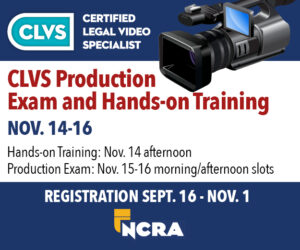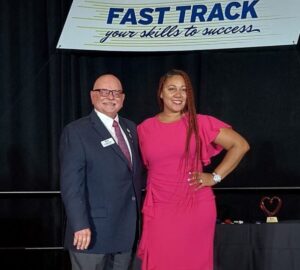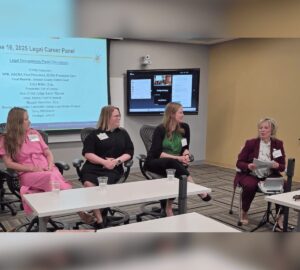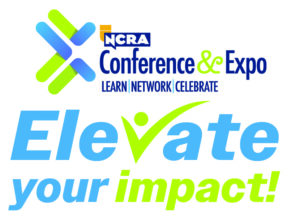By Cheryl Haab
Jennifer Esquivel has been a certified shorthand reporter in the state of California since October 2014 and is currently working towards her RPR. While in school, Jennifer faced a variety of challenges during her student career, from raising a daughter on her own to navigating a potentially devastating breast cancer diagnosis. Despite these difficulties, however, Jennifer successfully completed the court reporting program at Sage College in 2014 and is now a working deposition reporter in Southern California. I took a moment to sit down with Jennifer to garner her perspective on her journey thus far, and what it means to her to be a court reporter and a member of NCRA.
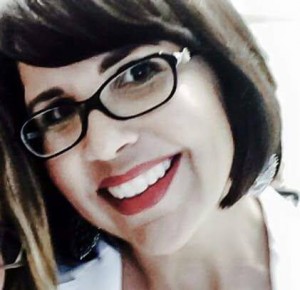 Court reporting is often touted as a great career for parents – in particular, single parents. As a single mom and new reporter, do you agree with this assessment?
Court reporting is often touted as a great career for parents – in particular, single parents. As a single mom and new reporter, do you agree with this assessment?
As a single parent for the last 13 years, there are two things I strived to achieve when choosing a profession to train for: financial independence and the freedom to be present for my daughter whenever possible. Every single parent has lost sleep, wondering how they’re going to make rent; every single parent has felt the pangs of disappointment when they weren’t able to attend an important awards ceremony or a championship game because of their job’s demands. Now that I have been in the field as a working reporter for almost two years, I’m proud to say this profession has afforded me both of those luxuries. Less than a year after I received my license, I had saved enough money to pay for my daughter to travel back east with her 8th grade class for a whirlwind week of touring historic places and visiting New York — something I, myself, have never had the privilege of doing. And I’ve found as a freelancer, I’ve been blessed to be able to simply remove myself from the calendar on certain days so my daughter can look out into an audience and see me, most likely sitting in the front row, and know that I’m there to watch her receive the recognition and awards she has worked so hard to earn. So, yes, court reporting has served to be the perfect profession for me as a single parent — one that I feel fulfills me in every way I had hoped a career would.
Finding out you had been diagnosed with breast cancer must have been emotionally devastating, to say the least. In the face of such adversity, what gave you the strength to continue with your court reporting studies?
I always like to say, “Nothing lights a fire under your butt to get something done like thinking you might die before you finish it.” Some may perceive it to be a grim thought, but it’s true. Having been diagnosed at 36, it had never before occurred to me I might not live to see my 37th birthday. And if you were to ask me to share the details of the events leading up to my diagnosis, I would be able to give you ample description of some and have no recollection of others. I think this is because once I learned my cancer had advanced to Stage IV, my mind and body reacted much like stenographers do when the speed picks up and the voices start to blend — we rely on muscle memory to get it down and get it done. I don’t purport to accurately represent how all cancer patients react to such news because I have learned we all deal with this difficult news differently. But being diagnosed so young, in the middle of my journey through court reporting school, and with a 10-year-old daughter, there was never any question in my mind about how I would react. It’s as if I was being told, “It’s now or never.” I instantly knew that regardless of whether I lived another six months, six years, or 60 years, I was going to live a life that made my daughter proud, my family and friends proud, and — most importantly — a life that, at the end of each day, I could lay my head down and know that should my eyes never open again, I had lived each day the best way I knew how and had made every effort to be the best mother I could be to my daughter. Lying in bed after treatment, catching glimpses of my Diamante set up across the room and knowing the neuropathy in my fingers from chemotherapy was preventing me from practicing, the fire in my spirit to finish what I had started only continued to grow; it never wavered. Giving up — on anything — was simply never, ever an option.
How do you balance your transcripts with your busy schedule?
Ah, this is the million-dollar question. For me, balance comes with allowing change each day. Some thrive on consistency, but I find that flexibility has been the key to finding a sense of fulfillment in all of the parts of my life: family, friends, work, health, “me” time. When I evaluate my schedule daily and rearrange my priorities on a regular basis, I find I am much more productive and, more importantly, happy with how I’ve spent my day. Now, that doesn’t mean you won’t ever find me hunched over my laptop while I sit in the stands, watching my daughter’s basketball practice. But because I’ve recently adopted a new goal of scoping my transcripts as soon as possible after taking down a job — say, within two days — and then sending them off to a proofer immediately after, I’ve given myself much more lead time to get them turned in and lessened the amount of frantic last-minute scrambling to get one finished before a deadline.
What are your ultimate goals for your court reporting career?
One of the things I absolutely love about this profession is that it allows you and even encourages you to keep learning. Now that I’m a licensed certified shorthand reporter, my next goal is to obtain my RPR and CRR. To date, I have passed the written exam of the RPR and look forward to taking the skills portion in the next few months. Having purchased some of the equipment necessary to provide realtime last fall, I am eager to move forward with becoming a realtime reporter, something that I firmly believe will open new doors and provide new opportunities for me as a court reporter. Hopefully, as my experience in this profession grows and I learn about the legislative and political aspects of keeping our profession healthy, I will be given the chance to serve on committees and trade association boards, providing me with the opportunity to serve this profession and the students who are about to join it much like those before me have.
How has continued involvement with state and national reporting associations benefited your career thus far?
Some of the best advice — some of the most useful advice I’ve ever received — has come from seasoned court reporters. And it wasn’t until I found myself standing in the middle of my first annual convention for one of my local trade associations that I realized how much there is to absorb when you’re in the presence of reporters who are there with you, hoping to hone their skill and find ways to become an even better reporter than they have been for the last five, ten, fifteen, or twenty years. And while I’ve always been outgoing and eager to socialize, court reporting — especially as a freelancer or student — can be very isolating. So it’s been through my membership with the Deposition Reporters Association, the California Court Reporters Association, and the National Court Reporters Association that I’ve been able to meet new people, find a few outstanding mentors, and store “emergency” numbers in my phone for those moments when I find myself needing last-minute advice. And it’s because of the networking I am able to do when I attend trade association events that I’m able to find the kind of work or jobs I’m looking for, produce accurate and high-quality transcripts, and provide feedback about my experience as a reporter to the key members who are in a position to make changes for the better.
If you weren’t a court reporter, what career would you be interested in pursuing?
While I have always loved the law, I come from a family of educators. And during my time as a court reporting student, I worked part time as a classroom aide, helping elementary school students who had fallen below grade level improve their reading and comprehension skills so they wouldn’t continue to fall behind and, hopefully, catch up to their peers. Education is very much an under-paid profession, but the fulfillment I felt in my heart and spirit more than made up for what my bank account lacked. Should my court reporting career end before I’m ready to retire, I would return to the world of education in hopes of finding a place where my desire to help children learn and grow would be appreciated and useful.
Cheryl Haab, RPR, is a freelancer in Westminster, Calif., and a member of the NCRA New Professionals Committee. She can be reached at cherylhaabcsr@gmail.com.






